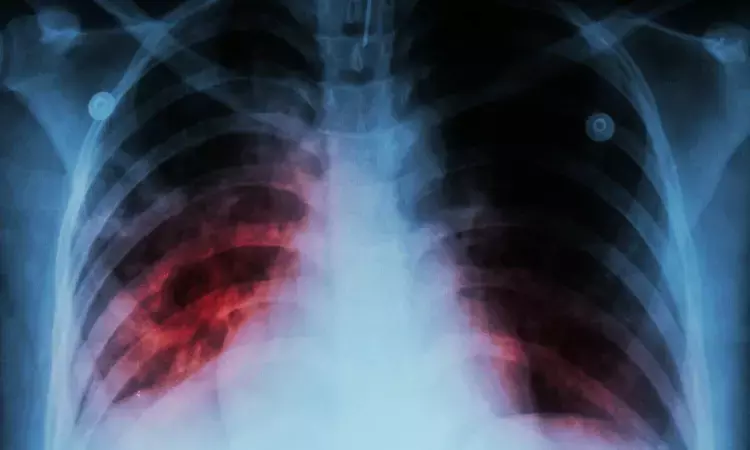- Home
- Medical news & Guidelines
- Anesthesiology
- Cardiology and CTVS
- Critical Care
- Dentistry
- Dermatology
- Diabetes and Endocrinology
- ENT
- Gastroenterology
- Medicine
- Nephrology
- Neurology
- Obstretics-Gynaecology
- Oncology
- Ophthalmology
- Orthopaedics
- Pediatrics-Neonatology
- Psychiatry
- Pulmonology
- Radiology
- Surgery
- Urology
- Laboratory Medicine
- Diet
- Nursing
- Paramedical
- Physiotherapy
- Health news
- Fact Check
- Bone Health Fact Check
- Brain Health Fact Check
- Cancer Related Fact Check
- Child Care Fact Check
- Dental and oral health fact check
- Diabetes and metabolic health fact check
- Diet and Nutrition Fact Check
- Eye and ENT Care Fact Check
- Fitness fact check
- Gut health fact check
- Heart health fact check
- Kidney health fact check
- Medical education fact check
- Men's health fact check
- Respiratory fact check
- Skin and hair care fact check
- Vaccine and Immunization fact check
- Women's health fact check
- AYUSH
- State News
- Andaman and Nicobar Islands
- Andhra Pradesh
- Arunachal Pradesh
- Assam
- Bihar
- Chandigarh
- Chattisgarh
- Dadra and Nagar Haveli
- Daman and Diu
- Delhi
- Goa
- Gujarat
- Haryana
- Himachal Pradesh
- Jammu & Kashmir
- Jharkhand
- Karnataka
- Kerala
- Ladakh
- Lakshadweep
- Madhya Pradesh
- Maharashtra
- Manipur
- Meghalaya
- Mizoram
- Nagaland
- Odisha
- Puducherry
- Punjab
- Rajasthan
- Sikkim
- Tamil Nadu
- Telangana
- Tripura
- Uttar Pradesh
- Uttrakhand
- West Bengal
- Medical Education
- Industry
Weight loss significant among patients with idiopathic pulmonary fibrosis treated with nintedanib

Japan: A recent study published in Pulmonary Pharmacology & Therapeutics has shown weight loss to be a critical issue for managing nintedanib-treated patients with idiopathic pulmonary fibrosis (IPF).
Idiopathic pulmonary fibrosis is a progressive, chronic, fibrosing interstitial pneumonia of unknown cause. It is mainly observed in older adults and is the most common form of ILD (idiopathic interstitial lung disease) for which there are unmet clinical needs.
Nintedanib is approved for treating idiopathic pulmonary fibrosis. Recent studies have shown that weight or BMI (body mass index) changes might be prognostic indicators for IPF and fibrosing interstitial lung diseases, including IPF. Weight loss is considered an adverse event during treatment with nintedanib and is a common complication exploitable as a prognostic indicator of IPF.
Hiromi Tomioka, Kobe City Medical Center West Hospital, Kobe, Japan, and colleagues report a single-centre, retrospective cohort study to examine changes in body weight during nintedanib therapy in IPF patients.
The study included sixty-one patients treated with nintedanib for >6 months (45 males, mean age 73.1 years). Baseline BMI and body weight were 23.2 kg/m2 and 60.1 kg, respectively.
The study led to the following findings:
- Mean weight loss during the first six months of nintedanib treatment was remarkable (−3.2 ± 3.4 kg) with CTCAE (Common Terminology Criteria for Adverse Events) grades 0,1,2 or 3 of 30, 17, 13 and 1, respectively.
- Pulmonary function test records were available six months before nintedanib administration in a subset of patients (n = 40).
- Significant differences in weight change over the six months before-vs-after administration of nintedanib were also observed in these patients.
- Multivariate analysis revealed that only baseline body weight was significantly linked with weight loss of CTCAE grade ≧2 (odds ratio 0.921). Median follow-up from nintedanib initiation was 34.8 months.
- The researchers found a remarkable difference in overall survival between patients with CTCAE grade ≧2 versus grade<2 (median survival of 25.5 months and 55.2 months).
- In the model adjusting for sex, lung function, and age, weight loss CTCAE grade ≧2 independently predicted all-cause mortality (hazard ratio 2.448).
To conclude, weight loss is common and significant after nintedanib administration in IPF patients. Weight loss during the first six months of nintedanib was shown to be an independent prognostic predictor, and baseline body weight was remarkably linked with weight loss during the first six months of nintedanib administration.
"Baseline body weight, that is, small physiques, should be considered in the choice of antifibrotic medication," the researchers wrote.
Reference:
Tomioka, H., Iwabayashi, M., Yokota, M., Hashimoto, R., & Amimoto, H. (2023). Weight loss in nintedanib-treated patients with idiopathic pulmonary fibrosis. Pulmonary Pharmacology & Therapeutics, 102213. https://doi.org/10.1016/j.pupt.2023.102213
Dr Kamal Kant Kohli-MBBS, DTCD- a chest specialist with more than 30 years of practice and a flair for writing clinical articles, Dr Kamal Kant Kohli joined Medical Dialogues as a Chief Editor of Medical News. Besides writing articles, as an editor, he proofreads and verifies all the medical content published on Medical Dialogues including those coming from journals, studies,medical conferences,guidelines etc. Email: drkohli@medicaldialogues.in. Contact no. 011-43720751


